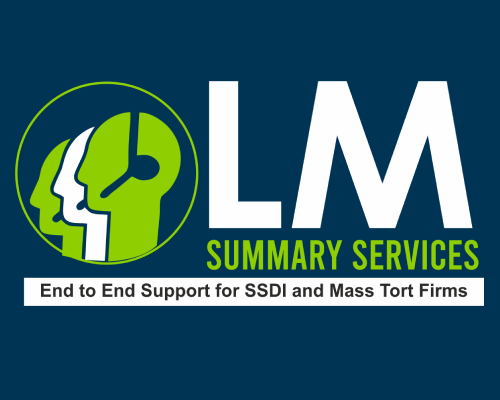Introduction
What makes a good story so compelling to us? Neuroscientists found out when humans hear an interesting story, it activates various brain regions, including those responsible for language processing, sensory perception, and motor responses. The overall effect creates a vivid sensory experience that cuts through the noise. In short, stories help us pay attention - particularly in this attention-hoarding era, when vying for people's focus is more coveted than ever.
One of the foremost challenges confronting today’s marketing teams is how to rise above the deluge of content rather than be swept away by it. Instead of relying on the next breakthrough AdTech tool or another tactic from your marketing arsenal, the focus should shift towards storytelling.
Effective storytelling can wield tremendous influence in promoting SSD law firms, particularly given their impactful mission of guiding clients through the intricate process of claiming disabilities. Their narratives can evoke profound emotional reactions to their audience over long periods. People don’t recall mere data; they remember stories.
Storytelling for Marketing

Storytelling increases engagement between a firm and the potential clients, which helps drive conversions and, ultimately, growth.
According to a study by Headstream, if people love a brand story, 55% of them are more likely to purchase the product or services in the future, while 44% will share the story, and 15% will buy the product/services immediately.
Headstream further found that 75% of surveyed customers believe that brands should use storytelling in their marketing, while 92% of customers want ads to feel more like a story.
What makes a good story?

The key to effective storytelling lies in focusing relentlessly on the client, not yourself. Whether crafting a personal anecdote or a marketing narrative, the client must always be the hero. A great story resonates when it addresses the audience’s pain points or desires, unveiling how your organization can help.
Moreover, effective brand stories share common traits:
- Entertaining. They capture and maintain the reader’s interest.
- Believable. They foster trust and engagement.
- Educational. They spark curiosity and deepen understanding.
- Relatable. They connect emotionally with the reader.
- Well-organized. They immerse the reader in a clear narrative structure.
- Memorable. They leave a lasting impression through inspiration, intrigue, or humor.
By adhering to these principles, marketers can craft compelling narratives that resonate and drive action.
Emotional Marketing

What makes Storytelling effective in capturing attention? That is obvious. We all know that a good story can be touching, funny, riveting, nerve-racking, eye-welling, goosebumps-inducing.
A good story triggers our emotions?and because of it, it bypasses our rational defenses.
Emotions play a greater role in decision-making than information. Advertisements that evoke feelings like happiness, nostalgia, or fear resonate deeply with viewers, making them more memorable and influential.
Neurosciencemarketing.com research demonstrates that ads focused purely on emotional content perform significantly better (31% vs. 16%) than those relying solely on rational arguments.
Storytelling is emotional marketing at its finest. It goes beyond product or service features to forge connections with clients. Strong emotional engagement correlates with increased customer advocacy. Storytelling thus functions as a powerful emotional marketing strategy, fostering connections that extend beyond mere consumption.
When customers emotionally resonate with a brand, they are more likely to share positive experiences with others. This organic word-of-mouth promotion is invaluable to businesses, as personal recommendations often carry more weight than traditional advertising.
Possible Storytelling Arcs within SSD Client's Journey

Marketing your SSD law firm to clients is undeniably challenging, not only due to fierce competition but also because of the significant hurdle - the elephant in the room - that often discourages clients from engagement: the inevitable, arduous SSD judicial process they must go through (where there is no guarantee of success).
Can the SSD law firm truly support them throughout this journey?
To effectively connect with clients and overcome their defenses, SSD law firms must employ storytelling. Storytelling has been shown to increase conversion rates by 30%, according to Search Engine Watch.
The key reason for this effectiveness lies in storytelling’s ability to humanize the firm’s services, thereby building trust and loyalty. By weaving narratives that span from initial applications, reconsideration, administrative hearings, to appeals council reviews, federal court review, and finally achieving the awarding of disability claims, SSD firms can inspire clients to persevere.
Effective marketing for SSD law firms hinges on crafting compelling story arcs that engage both potential and current clients, reinforcing their role as trusted representatives and ensuring clients remain committed to their journey.
Overcome the Threat/Monster/Evil

In classic tales, the hero must defeat a looming threat to restore balance. For SSD firms, this translates to helping clients (the heroes) overcome financial hardships due to disabilities, and navigating the intimidating bureaucratic labyrinth that is the SSD/SSI benefits applications process. By branding their services around this narrative, SSD law firms position themselves as steadfast allies, supporting clients until the obstacle is conquered.
Rags to Riches/Survival

This archetype features a humble but virtuous character who achieves a happy ending after starting from the bottom. In the SSD realm, this mirrors applicants enduring to survive despite significant challenges thrust upon them. The SSD law firm acts as a guiding mentor, providing the necessary tools and information to help clients regain their footing and thrive.
The Quest/The Long Journey

The Quest, exemplified by stories like The Odyssey, involves a protagonist facing numerous challenges over time. Unlike the swift transformation in “Rags to Riches,” the client’s journey with an SSD law firm is a long-term commitment.
For SSA applicants, the quest can sometimes take years. Initial applicants must wait up to 120 days. When denied, they could opt for reconsideration, which could take as much as 120 days. Wait times for an administrative law judge hearing take 12 to 18 months, and its decision may take up to 90 days (about 3 months). An appeal may take another year, while a Federal Court Review (or final adjudicator when all applications are denied) could take 2 years.
Certainly, the law firm’s unwavering support during this quest ensures the client perseveres through all obstacles, highlighting a companionship that withstands the test of time
Voyage and Return

Stories like Cast Away, Star Trek: Voyager, and Alice in Wonderland depict heroes navigating unfamiliar worlds and finding their way back. Similarly, SSD clients often face a new, challenging reality. The firm assists them in acclimating to this new world and supports their journey back to normalcy, regardless of how long it takes.
Comedy
Shakespeare’s comedies revolve around resolving confusion before the protagonists find harmony. SSD clients often face continuous setbacks, like denied claims or poor legal representation. The SSD law firm steps in to untangle the chaos, and clients, while reminiscing events before they got their claims successfully, realizes that their journey was a comedy of errors after all.
Tragedy
The tragedy arc is an option, but SSD law firms must handle it delicately. Tragedy is inherently evident, so to be effective as a marketing strategy, it must offer hope. Lynne’s story is undoubtedly tragic, as she lives with metastatic fibrosarcoma and desmoid tumors on her shoulder and arm. However, thanks to her disability insurance, she continues to lead a meaningful life through her artwork and community interactions, helping others cope with their disabilities.
Storytelling Media Formats

SSD law firms and advocates have a variety of storytelling formats at their disposal. Utilizing different media can help convey their messages more effectively and reach a wider audience.
Infographics
Infographics are a powerful, shareable format that combines information, data, and visuals to present complex ideas in an engaging and easily digestible manner. For example, infographics can simplify the multi-staged processes involved in the Social Security benefits applications process. Data-driven storytelling can work here, or it can illustrate a good old fashion here's journey that can both visually delight and intellectually stimulate readers.
Videos
As one of the most engaging formats, videos connect with audiences on a deeper level, creating memorable experiences and effectively sharing ideas. To promote your SSD law firm, videos can be a powerful medium in sharing real life experiences of clients who have gone through SSD processes and succeeded in receiving their claims with your assistance. Videos can be featured on traditional TV, or on video streaming sites, like YouTube, Vimeo. Short form videos have also surged in popularity thanks to TikTok and YouTube shorts.
Podcasts

Podcasts have become a cultural phenomenon, offering a unique and personal connection with listeners. SSD firms can leverage podcasts to share their brand values, showcase thought leadership, and provide an intimate listening experience filled with stories, expert interviews, and insights. Episodes featuring former clients sharing their experiences and tips on overcoming obstacles are especially valuable for your target audience.
Blogs

Despite the rise of video content, blogs remain a powerful storytelling medium. They provide a platform for in-depth narratives, thought-provoking insights, and detailed information. SSD law firms or advocate groups can use both long-form and short-form blog articles to engage readers and strengthen their connection to your brand.
Social Media Stories
Social media platforms have embraced “stories” as an engaging form of storytelling. These short-lived, dynamic stories best embraced by modern audiences with shorter attention spans with a vertical, mobile first format, create a sense of urgency, community, and exclusivity to form an awareness of SSD causes and agendas.
User-Generated Content (UGC)
User-generated content (UGC) is a valuable storytelling tool for SSD firms. With 79% of people influenced by UGC in their purchasing decisions, it showcases genuine client experiences and opinions. Encouraging users to share their personal stories through testimonials, forums, and social media posts fosters a sense of community around the firm and its mission, making people feel more involved and connected.
Storytelling Campaigns

Storytelling in digital marketing can elevate your campaigns when used effectively, but understanding how to implement it can be challenging. Here are a few ways to integrate storytelling into your brand's marketing plan:
Create a Brand Story
Your first step should be crafting a compelling brand story that outlines your law firm’s origins and journey. This story should include your mission, the values your SSD law firm stands for, and a detailed timeline of your organization?s evolution.
Data-Driven Storytelling
Data-driven storytelling transforms raw data into engaging narratives, making complex information easy to understand. Utilizing tools like infographics and visualizations, this approach highlights critical data for SSD applicants, helping them grasp the process they need to navigate. For instance, showing that clients with musculoskeletal, nervous system, or sense organ issues have historically had the highest approval rates for disability insurance can provide hope and clarity.
Storytelling in Email Marketing
Storytelling in email marketing can be delivered through a single, long email or a drip campaign that unfolds the story chapter by chapter. This approach can be customized to cater to clients’ specific needs and expectations, depending on their stage in the SSA process. Clients appreciate hearing stories that closely mirror their unique circumstances. Use MailChimp to automate your client emails, integrated with your CRM using Law Ruler.
Conclusion

Stories are what make the world go round. For SSD law firms, it?s the partners who must set this narrative in motion by making storytelling the cornerstone of every marketing initiative. Storytelling allows firms to connect emotionally with clients, making their struggles and successes relatable and compelling. By sharing real-life examples of clients overcoming obstacles with the firm's help, partners can build trust and credibility. SSD law firms, like any other business, that neglect storytelling may end up spending more on technology and trends to drive growth - yet still fall short. Plato was still right when he said, ?Those who tell stories rule society.? By harnessing the power of stories, firms can inspire, educate, and ultimately foster deeper connections with their audience, ensuring long-term success and client loyalty.
NEED HELP TELLING YOUR BUSINESS' STORY?
Telling stories is what the Disability Law Marketing Agency does best. With over 15 years of experience in SSD law firm marketing, we deeply understand the challenges applicants face. We don’t just craft compelling narratives; we help SSD law firms enhance their engagement with applicants by capturing the essence of your firm’s mission. Partner with us to explore your organization’s core?your identity, values, and the impact you have on clients’ lives. Together, we’ll craft a powerful story, showcasing the hero’s journey of your clients.





 Home
Home